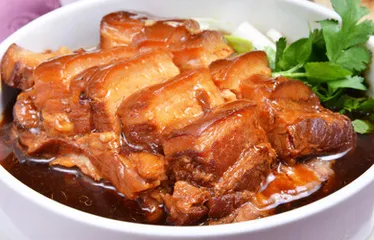Honey pumpkin is simple and effective
Recommended this week: Honey Pumpkin Low-calorie Food Exchange Area>>

Pumpkin 200 g Calories: 44 calories
Excipients:

Red dates (5 pieces) 100 g Calories: 122 calories

wolfberry (10 pieces) 100 g Calories: 72 calories

Lily (10 g) 100 g Calories: 162 calories

Lotus seeds (5 pieces) 100 g Calories: 344 calories
Seasonings:

Total calories: 35 calories/person-More calories query Your body needs calories
Honey Pumpkin-The Principle of Weight Loss
Principle of slimming: Pumpkin has the effect of losing weight and lowering blood sugar. Pumpkin is rich in trace elements cobalt and pectin. The content of cobalt is high, which is unmatched by any other vegetable. It is a trace element necessary for islet cells to synthesize insulin. Eating pumpkin regularly helps prevent and treat diabetes. Pectin can delay the absorption of sugar and lipids in the intestine. Autumn is the time when pumpkins are most nutritious. The reason why eating pumpkin often helps to lose weight is that pumpkin is rich in dietary fiber, which not only provides a strong feeling of satiety but also promotes digestion, and the calories of pumpkin are very low.
Since ancient times, honey has been an expert in adjusting the intestines in terms of the efficacy of herbal medicines. The fatty acids contained in honey can promote the active peristalsis of the intestines; the rich vitamins and minerals can regulate the intestines and intestines, expel toxins from the body and improve constipation; and the glucose and fructose components will not burden the intestines and intestines. The reason why eating honey can lose weight is that it contains very low calories, only 75% of the same amount of white sand sugar. 100g of honey contains 294 calories. Even if you eat 200g a day, the calories you absorb are only 600 calories. Compared with the normal standard of consuming 1,200 to 1,500 calories, it is a long way away. Therefore, although it is a "dessert", it can still achieve weight loss. In addition, honey contains easily absorbed vitamins and minerals, which can supplement vitamins B, C, potassium, calcium, etc., and will not destroy the body's nutritional balance and is a good way to lose weight.
Honey Pumpkin-Making Steps

1 Prepare pumpkins
Skin and core the pumpkin, clean it, cut it into large pieces and set aside.

2 Preparation of ingredients
Bubble dates, wolfberry, lily, and lotus seeds in hot water and wash them thoroughly.

3 Steamed pumpkin
Put the chopped pumpkin and ingredients into a bowl, boil the pan and steam for 15-20 minutes.

4 completes
Finally, pour honey on the steamed pumpkin.
Share it on my Weibo
This issue of nutrition consultant

Special guest Sylvia Wang, Master of Food and Human Nutrition at the University of Florida, deserves to remind that the principle of using pumpkins as diet food is to replace the staple food of pure carbohydrates such as rice and noodles with vegetables containing a certain amount of starch., reducing calorie intake and increasing satiety.
Dietitians often put pumpkins on their diet list
Sylvia Wang: Pumpkin is rich in carotenoids, such as beta-carotene, zeaxanthin and lutein. Its composition and content depend on the type of pumpkin. The calories of this dish are mainly determined by honey, and just adding a tablespoon of honey increases the energy to 178 calories. If you still maintain your original diet size and exercise habits during the weight loss period, and use the "diet dish" as an extra meal, there will be no weight loss effect.>> See more ways to lose weight